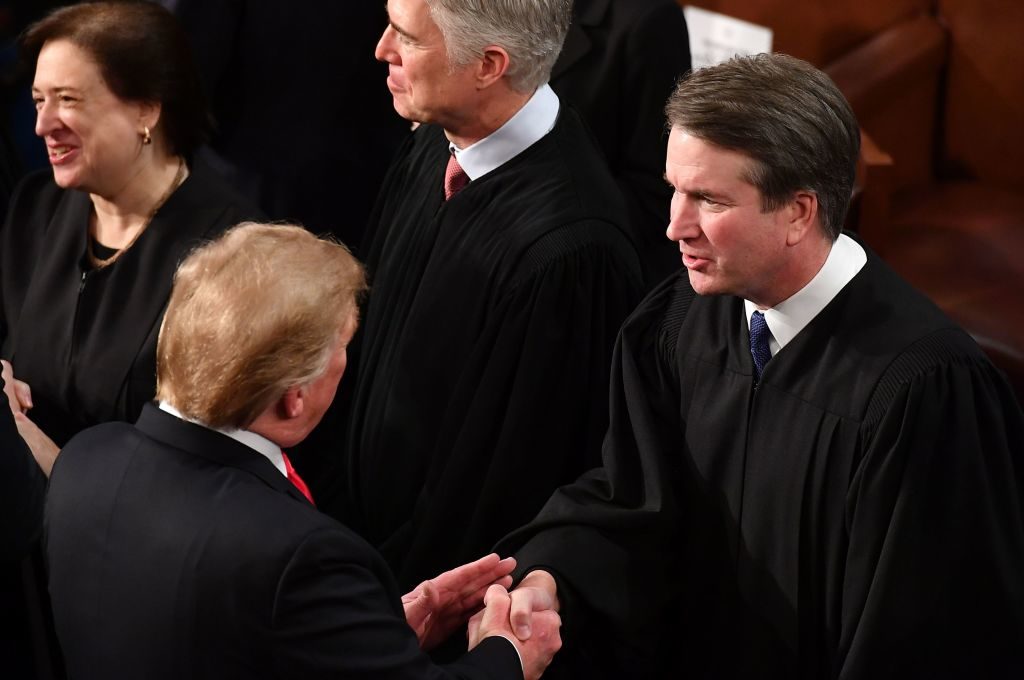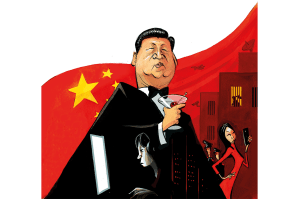Tell me how you judge Brett Kavanaugh, and I’ll tell you who you vote for. In a divided polity, Kavanaugh cuts a Janus-faced figure. He’s that rarity, a Bushie who made good in the Trump era, but also he’s the favorite jurist of immigration restrictionists. He’s the almost too wholesome basketball dad, but he’s also the sex-predator threat to American womanhood. His swearing in was widely seen as a victory for conservatives, and raised fears of on the left that the bench was tipping right. But many on the right feared his triumph would be Pyrrhic: too much political capital had been spent on a justice with a record to the left of Antonin Scalia.
‘Trust the process,’ former White House chief strategist Steve Bannon told me last year on Kavanaugh. Bannon’s advice was a nod to the seemingly quixotic personnel strategy pursued by Sam Hinkie, the former Philadelphia 76ers general manager. From the perspective of the Trumpist right, for whom Bannon is a lodestar, time may now have confirmed the wisdom of Kavanaugh’s long game. Like the modern Sixers in the NBA, Justice Brett Kavanaugh is a force to be reckoned with.
This week saw Kavanaugh’s biggest dunk yet. Not only did he join the Court’s liberals in a ruling against Apple, the baddest of the tech giants, but Kavanaugh also took it upon himself to write the opinion. Though court watchers are careful to note this is just one decision, conservative defenders of President Trump’s uncompromising support of Kavanaugh’s nomination are feeling vindicated.
After the ruling, I talked with conservative attorney and activist Ian Mason for Spectator USA’s new Washington Shots podcast. Kavanaugh, Mason told me, has shown ‘an instinct for where the law is headed’, and perhaps the country too. Mason throws in a dig: it’s not surprising that those most vocal in their horror at Kavanaugh’s jurisprudence are often ‘the same people who are generally skeptical of the idea that changes need to be made between the relationship between government and tech’.
And this is where the case of Apple v. Pepper gets interesting. There’s a war on for the right that wasn’t settled by Donald Trump’s paleoconservative capture of the White House. Tech is its newest front. ‘Some overeager anti-Silicon Valley “conservatives” seem to be praising Kavanaugh for “taking on” Big Tech,’ writes Josh Hammer of the Daily Wire, a project of a NeverTrump original Ben Shapiro. ‘But the reality is that there is nothing even remotely conservative about unduly expanding the inherently flawed corpus of antitrust law.’ It’s worth pointing out that the Daily Wire punches well above its weight when it comes to Facebook traffic.
Kavanaugh and President Trump’s first pick for the Court, Justice Neil Gorsuch, may be becoming avatars of the competing — and not necessarily mutually exclusive — directions the administration could go between now and 2020. While Kavanaugh ruled against Apple this week, Gorsuch’s early rulings have shown a libertarian streak more in line with traditional American conservatism. It’s striking that Gorsuch wrote the dissenting opinion in the case that held that iPhone users should be able to sue the mothership. A Gorsuch-style administration might double down on Trump’s early tax cut and deregulation victories — and perhaps take another swing at Obamacare.
A more Kavanaugh-style approach would emphasize populist themes: immigration-skeptical, tariff-curious, and agnostic on the need to jettison all of Barack Obama’s healthcare law. During his confirmation process, some conservatives criticized Kavanaugh for seeming too sympathetic to Chief Justice John Roberts’s opinion in 2012 that preserved much of Obamacare. Taken together, Gorsuch and Kavanaugh represent the ideological inconsistencies of Trump himself —the president who has lashed out at Obamacare, but who expresses sympathy for socialized medicine.
One position most modern conservatives seem to agree upon is rejecting the legacy of Trump’s Republican predecessor. George W. Bush is more popular today in an MSNBC greenroom than on a Breitbart comment board. But that’s where the agreement stops. Each faction on the right is trying to bestow Bush’s crown of thorns on its ideological rivals. As Josh Hammer notes, the Supreme Court’s junior-most justice, the ‘lifelong inside-the-Beltway D.C. swamp creature who Daniel Horowitz once perfectly described as “Karl Rove in a robe”, just sided with the Court’s four liberals.’
The ideological battle for the future of tech is messy, and just getting started. ‘Specifically,’ Ian Mason tells me on Washington Shots, ‘for conservatives, if they want to survive as an ideological force need to become comfortable to break the institutional power of the tech oligopoly over debate in this country.’
https://audioboom.com/posts/7262024-is-brett-kavanaugh-the-new-maga-justice

























